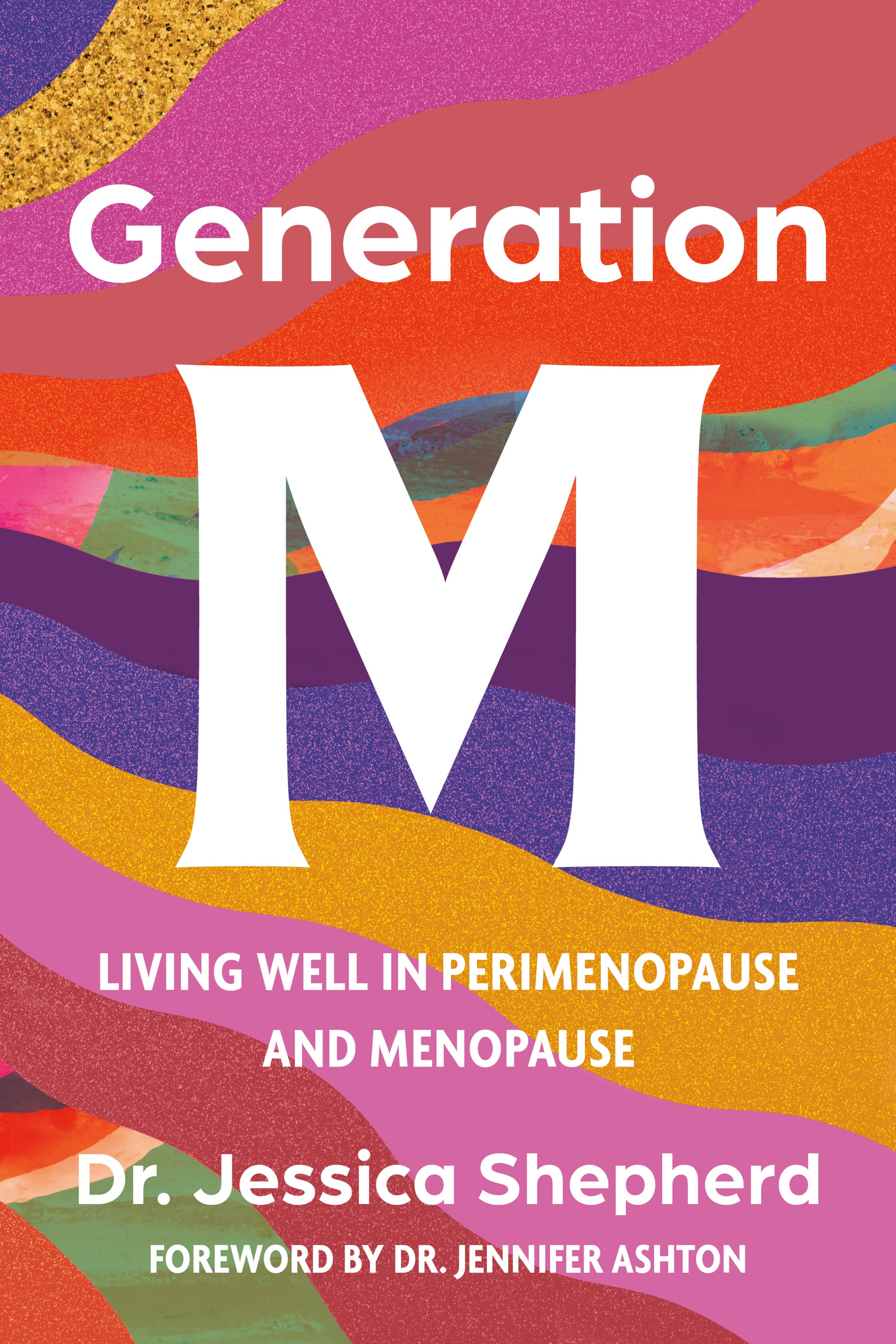Get Lit with Dr. Jessica Shepherd: An Exclusive Excerpt from “Generation M”
Who
Dr. Jessica Shepherd is an award-winning physician and board-certified OB/GYN. She's a trusted expert in menopause and the field of women's health dedicated to making complex health topics accessible and engaging.
What
This book is an evidence-based and lifestyle-oriented guide for the new generation entering perimenopause and menopause. With clinical insights, actionable tips, and holistic guidance, Dr. Shepherd redefines how to sustain the marathon of this life stage so you can make the most of your health and vitality. Discover the steps you need now for the future you desire—and stay healthy, active, and fabulous along the way.
Why
Dr. Jessica Shepherd says she wrote this book because, “I have spoken with and spent time with so many women in my career as a gynecologist and I knew that this midlife transition was so much more than just hormones, it is the changes that occur for ALL women physically, emotionally, and sexually.”
“I wanted this to be a book that formed a community, took away the stigma of society, and empowered women—including myself—to enter this journey of menopause with grace. The tools given in this book are to make the path less threatening than it has been portrayed in the past. Generation M is a call to all women to know their worth in age and longevity.”
& We
…chose Generation M as our Get Lit pick because it combines science-backed insights, practical advice, and a message of self-empowerment that encourages meaningful discussions about aging, wellness, and self-care. Enjoy!
Here’s Your Exclusive Excerpt
The Japanese have a term for menopause: konenki. It refers to a period of renewal and reflects the view that women’s lives go through many stages. It encourages us to honor the transformations that our bodies, minds, and spirits go through. Each stage of the journey is valuable; each stage is to be treasured.
Change is an inevitable part of the cycle of life, as is aging. How you deal with it is largely up to you. I believe midlife can be a time of empowerment and personal growth. Yes, it brings substantial biological, psychological, social, and emotional changes, especially for women as we go through perimenopause and menopause. I encourage you to, instead of fearing these changes, take ownership of the experience and be an active participant in the journey. When you make the choice to prepare by learning the facts, benefiting from the wisdom of the community, and creating healthy habits, you can optimize how you experience every stage.
More than a million women in America enter menopause each year, and one billion women are anticipated to reach that stage by 2025. Despite these vast numbers, there remains a persistent stigma that prevents women from speaking openly about it. The personal, societal, and economic cost of continuing to push menopause into the background is too high. It is up to us, as proud members of Generation M, to change that.
Women’s health, through adolescence, pregnancy, menopause, and aging, has been put on the back burner for centuries. That not only fails women, it fails society at large. Women are so often at the center of their families. We comprise half the workforce in this country. If we are not functioning at our best, it has a negative impact on the people in our lives, from family members to employers. It behooves us to think of menopause as so much more than a “woman’s” issue.
It is just as important to recognize the long history of racial disparities in health care in the United States. Recent studies have pointed out the large variations between African American, Hispanic, Japanese, Chinese, and Caucasian women when it comes to the severity of their symptoms and the treatment options they are offered. Education, financial strain, family history, and health habits also impact menopause. None of this was taught in medical school. As a Black female physician and menopause expert, I am dedicated to ensuring that when we talk about menopause, all women are included.
Fast forward to my initial interactions with patients while I was doing my residency in OB/GYN at Drexel University–Hahnemann Hospital in Philadelphia and quickly saw the real-life effects of this systemic avoidance of the intricacies of menopause. One morning, a woman named Carol came into the clinic where I was working, com- plaining of horrific night sweats. She couldn’t remember the last time she slept through the night, and she was clearly depressed. In a whisper, she confided she had also lost all interest in sex. The doctor she had seen before had asked her about hot flashes but nothing more. She was left to assume her loss of libido was due to some failing on her part rather than a common response to fluctuating hormones. At the time, there weren’t many treatment options to offer. The research into menopause in general, and hormone replacement therapy specifically, was sparse and often misleading. While I assured Carol that what she was going through was completely normal, I wanted better answers for her, and for all women entering this stage of life. Myself included.
We have made progress since those days, but not enough. As a society, we remain largely uncomfortable speaking about women’s reproductive health in general and menopause in particular. The cloud of embarrassment and shame that surrounds the topic has led to gaps in awareness, education, and advocacy. It prevents women from being able to make informed decisions based on the latest research, and benefit from the full range of medical and lifestyle options now open to us.
As you will learn in the pages that follow, having a sense of purpose is one of the key elements of both emotional and physical health. My own purpose is to champion the discussion around this time of women’s lives and help us all push past limiting beliefs into a future where women feel powerful, sexy, and valued no matter their age.
Too many women are still embarrassed to talk openly about perimenopause and menopause. The sense of being alone, and the silence it leads to, can prevent you from learning about the symptoms, treatments options, and lifestyle changes that can help you feel your best, have more energy, experience better sleep, enjoy satisfying sex, lower your risk of certain diseases, and have a stronger sense of self. The more you can use this knowledge to prepare, whether you are in your thirties, forties, fifties, or beyond, the better you will be able to face the future from a place of physical and emotional strength.
That is the work we are here to do together.
Own Your Journey
As overall health improves and life expectancy increases, most women can expect to live 40 percent of their life after menopause. That is a powerful incentive to take control of your health now. Owning your menopause journey by implementing the concrete positive steps you will find here not only will help you feel empowered, but can lessen symptoms and improve your quality of life for all the years that follow.
Stop for a minute and ask yourself: When I look at my future, how do I want to feel? What can I do today to set myself up for a healthier tomorrow? These are the questions we are here to answer.
There is no one-size-fits-all solution. Rather, the most successful strategy for thriving through perimenopause, menopause, and aging in general includes small adjustments to your lifestyle habits such as exercise, nutrition, psychological practices, mindfulness, and medication. This whole-life approach is particularly important when it comes to dealing with hormonal transitions, because the symptoms themselves are so interrelated. Here’s just one example: hot flashes can interrupt sleep. Interrupted sleep can make weight gain more likely. Weight gain can put you at higher risk for certain diseases. The good news is that just as there is a cascade effect with symptoms, there are ways to interrupt the cycle. Exercise can help improve sleep and weight gain. Stress-reducing techniques can improve brain and physical health.
Throughout this book, you will learn how to make the small changes that have a big impact on virtually every area of your life and health. These are realistic, actionable steps you can fold into your diet, fitness, and lifestyle routine. Steps that you choose. Steps that you can stick with. Steps that will enable you to become the CEO of your own health.
Research published by the British Journal of General Practice shows that it takes ten weeks to build a new habit, and the best way to make the habit stick is through small incremental changes. For you, that might mean building five minutes of breath work into your day, adding more protein to your diet, or learning to recognize and change negative self-talk. In this book, you will find specific ways to do just that and more, and you can return to these pages again and again, continually adding more building blocks to your repertoire.
It will take practice. Society sends women going through perimenopause and menopause the message that our value diminishes after our reproductive years. It can be hard not to internalize those wrongheaded beliefs and devalue ourselves. I truly believe, though, that each positive step you take will lead you to a new sense of agency and the confidence to write your own narrative.
Excerpted from GENERATION M by Jessica Shepherd. Copyright © 2024 by Jessica Shepherd. Reprinted by arrangement with Union Square and Co. All rights reserved.
Dr. Shepherd recently took part in You and Your Brain: Perimenopause Explained, a virtual series brought to you in partnership with the Women’s Alzheimer’s Movement, Prevention and HealthyWomen. You can watch the full conversation here.
Discussion Question: How does Dr. Shepherd's perspective on menopause challenge the traditional narrative around women and aging?
Please note that we may receive affiliate commissions from the sales of linked products.




